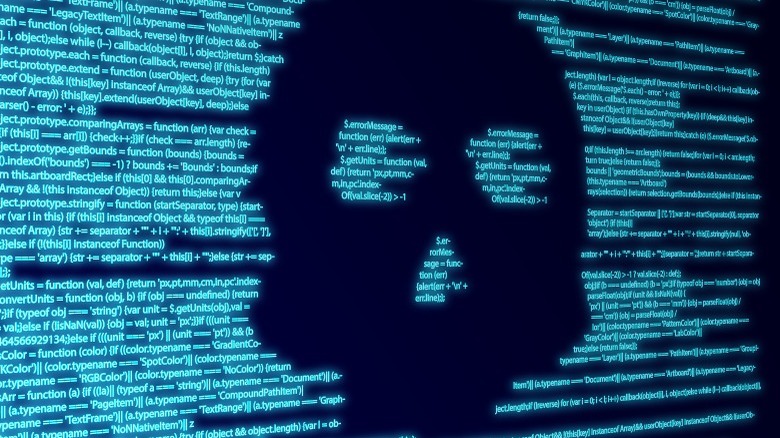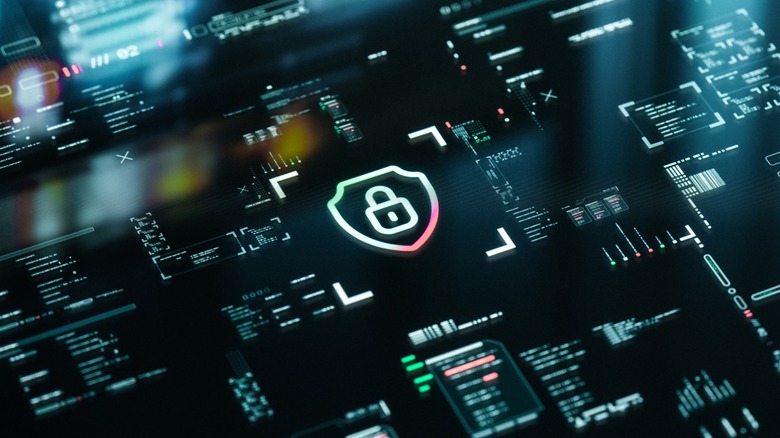Dark Web Vs Deep Web Explained: What's The Difference?
The internet was created in 1983 and has become a key part of our everyday lives. In fact, Statista reported there were 5.35 billion internet users as of January 2024. But while millions of people spend their time surfing through Google and other search engines, there are deeper and darker parts of the web a lot of people don't know exist.
You've probably heard the terms "deep web" and "dark web" thrown around on the internet, on TV, or maybe even in real life. Though they're often used interchangeably to refer to the more questionable areas of the internet, they're quite different. And understanding these differences is a dive into the true depth of the internet. While the average person usually limits their browsing to the "surface web," these other parts of cyberspace re still teeming with life and have become home to many users, both benign and nefarious. With that said, here's all you need to know about the dark web, the deep web, and their differences.
What is the deep web?
Right at the top of the internet is the surface web, which is made up of everything you can access with everyday browsers and search engines. But below the surface lies the deep web — the parts of the internet that aren't indexed. So they're right there on the internet, but you can't find them by doing a quick search. While it may come as a surprise to some, about 7,500 terabytes of all the information on the internet is on the deep web, compared to only 19 terabytes on the surface web.
But how does this work? Let's break it down: Every search engine has bots, known as web crawlers or spiders, that go through the information on the internet and save it in the search engine's index. When you place a search on Google, the search can only look through indexed sites on the internet. However, some websites aren't indexed at all — this is what makes up the deep web. It's basically anything you can't find or access through a Google search. For example, this includes streaming services like Hulu that require payment and registration, subscription-based news services or academic journals, and private databases of data from sites like PayPal or Cash App. The deep web is also home to the dark web, which is where you'll find a lot of the shady parts of the internet.
What is the dark web?
At the very bottom of the deep web is a small corner of the internet called the dark web. As threatening as it may seem, it only makes up a tiny portion of the deep web — less than 0.01%. Like the deep web, websites on the dark web aren't indexed, so they can't be opened using regular search engines. What makes the dark web different is that it can't be accessed with your everyday web browser — this anonymous and decentralized portion of the internet requires a special browser.
Dark net sites form a network that is protected by loads of encryption. Browsers like Tor (or The Onion Router) are able to peel back the layers of encryption, kind of like how you peel back the layers of an onion. Once it bypasses these layers, you get access to the content available on the dark web. The dark web is also extremely private as your online traffic goes through various servers all over the world before reaching a destination, and each server only knows the location of the one right before it, not its origin. So in theory, no one, not even the site you're accessing, can see your IP address, track your browsing history, or trace anything you do on the dark web back to you.
Purpose and intent
What exactly are the deep and the dark web used for? For starters, they both exist to offer people a higher degree of privacy than what is available on the surface web. The deep web is mostly used to store confidential information that would be vulnerable if easily accessible on the surface web. So unless you have the correct login details for certain information on the deep web, it can't be accessed. This is great because you can have peace of mind knowing that sensitive data — like your medical information or internet banking profile — is safe.
On the other hand, the dark web takes privacy to a different level, allowing users to browse and communicate completely anonymously. When most people think of the dark web, they often think of illegal activity. Though the level of anonymity on the dark web has made it a haven for criminal dealings, that's not all it's used for. It's also used by regular people looking to browse privately and ensure their information or internet traffic isn't monitored or tracked. They're able to access books or academic journals that may not be available on the surface of the web and make payments using ostensibly anonymous currency like Bitcoin. Another category of dark web users includes journalists and whistleblowers who want to share confidential or sensitive information without fear of censorship or legal action.
How are they accessed?
Although you can access the surface web with your default search engine like Google or Bing, getting on the deep or dark web is a bit different. The deep web can be accessed using regular web browsers as long as you have the right credentials to access the information. However, what makes the deep web different from the surface web is that content is not indexed and cannot be found simply using search engines. But that's the fun part: You may not know it, but you already surf the deep web every day. When you log into your email, social media profile, or favorite video or music streaming platform, you're using the deep web. These pages remain exclusive to you as long as your username and password remain confidential.
The dark web, on the other hand, is a totally different ball game. Dark net websites can only be accessed using designated browsers like Tor or I2P, and they're different from those you come across on the surface web. For one, they usually don't have any recognizable URLs, just a string of numbers and letters. Also, all dark net sites end in .onion, not .com or .org. The most popular browser is Tor. Tor anonymizes your online activity by passing your connection through at least three points, making it a lot harder to trace anything back to you. Other dark net browsers like I2P and Freenet work in similar ways.
Different content types
Search engine bots don't crawl and index every piece of information on the internet. There are some sites they are restricted from accessing, and others that just aren't relevant. But just because this information isn't indexed doesn't mean it isn't there. Most information on many websites is contained on the deep web — it is typically made up of private information from the individual pages or profiles of websites on the surface web. These pages are usually password protected and are only open to users with the right login credentials unique to the user they are registered to.
The content on the deep web includes medical and financial records, content hidden behind paywalls like subscription-based services and academic journals — even your Google search results, or other generated pages that do not already exist on the deep web. On the dark web, you'll find a lot that you ordinarily would on the surface web — blogs, mail services, marketplaces, games, and forums — but these pages are entirely concealed. Many people use the dark web in the same way they use the surface web but probably opt for the former because they value privacy. But most of what goes on the dark web is illegal. Several sites and marketplaces are dedicated to the sale of illegal drugs, weapons, passports, credit card details, and even identities. You can even hire services like hacking. It's some really dangerous stuff.
Anonymity
While the deep web is unindexed, it's not necessarily anonymous. A lot of information on the deep web requires you to log in to an account to keep your data secure, but this also makes it traceable to your identity. Websites on the deep web still use cookies and trackers to collect data from users. Your IP address is also still visible when you visit a site on the deep web and your exact location can be pinpointed. So if your goal is to surf the web completely off the radar, the deep web won't be of much help.
The dark web, however, is almost entirely anonymous. Whenever you visit a website or do pretty much anything on the internet, your IP address can be used to pinpoint your exact location. This is how websites and even the government track your internet activity. But if you use the dark web, your activity and communication are protected by layers of encryption so that when your connection reaches a website or server, it's difficult to find its original source. This anonymity is what makes the dark web a safe haven for hackers and other criminal activities. To maintain this ghost status, transactions on the dark web are usually done via cryptocurrencies like Bitcoin, which are also difficult to trace.
Security risks
Most of the content on the deep web is mundane, perfectly legal, and not that different from what's on the surface web. But this doesn't mean you're completely safe. You still run the risk of falling victim to email fraud and scams on online shopping sites. There are also many suspicious links and websites that can infect your computer with viruses and malware. You might think you're downloading a song or a book, but the file is actually a trojan horse carrying dangerous software. All this can be easily avoided if you take safety measures when browsing the deep web to ensure your private accounts aren't compromised. Otherwise, your information might end up for sale on the dark web.
The same can't be said for the dark web. The dark web is largely unregulated, which makes it easy for a lot of illegal online activity to go unchecked. You're exposed to the risk of scams and identity theft. Many sites on the dark web are secret ploys for different types of cyberattacks like malware, ransomware, or phishing exploits to obtain your information for fraudulent activity or sell. Due to how anonymous the dark web is, it's harder to find the source of these exploits. And because there are no concrete laws regulating the dark web, it's much harder to hold anyone accountable.







